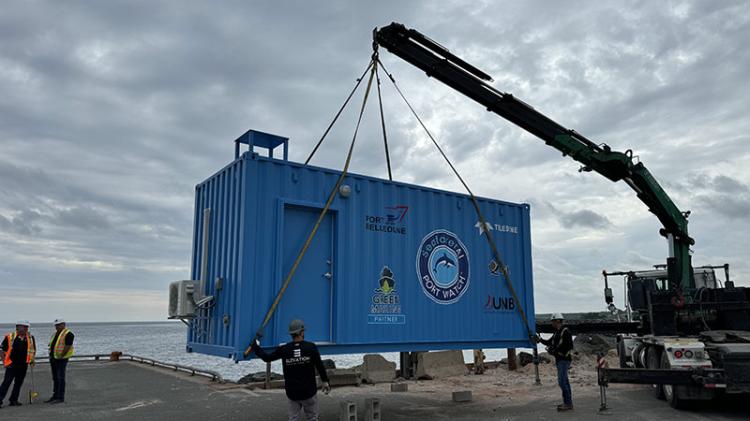Researchers from the University of New Brunswick (UNB) will be contributing their expertise in areas ranging from ocean floor mapping, to cybersecurity, to AI-based change detection, and more, to a pair of projects under the PORT WATCH banner led by New Brunswick company SeafarerAI.

Funding for these projects was announced on Sept. 9 and Sept. 12 in conjunction with the ALL IN conference event. Two major projects will receive funding from DIGITAL, Canada's Global Innovation Cluster for digital technologies, and from Canada's Ocean Supercluster (OSC).
"This new funding supports, and reflects, the tremendous potential that results from industry innovators and academic experts joining forces to tackle complex challenges," said Dr. David MaGee, UNB vice-president research. "I look forward to seeing what SeafarerAI and our research community are able to accomplish together."
Among the UNB researchers and teams participating in these projects are:
- Dr. Ian Church, associate professor of geodesy and geomatics engineering and a leading expert in subsea mapping techniques, and the Ocean Mapping Group he leads;
- Dr. Hung Cao, assistant professor of computer science who specializes in Internet-of-Things and AI research, and his Analytics Everywhere Lab;
- Dr. Shabnam Jabari, associate professor of geodesy and geomatics engineering and a leading expert in digital twin generation and maintenance techniques, and her Advanced Spatial Intelligence Lab; and
- the Canadian Institute for Cybersecurity.
Additionally, researchers from the SPECTRAL Spatial Computing Research Centre and the Research Institute for Data Science and Artificial Intelligence are presently exploring opportunities to take part in these and other related PORT WATCH initiatives.
The PORT WATCH initiative aims to "integrate artificial intelligence, subsea mapping and remote sensing, change detection, and other components to develop a proof-of-concept solution for complete situational awareness of the underwater domain as well as the surface of the water," according to SeafarerAI.
"At SeafarerAI, we are thrilled to partner with the brilliant minds at the University of New Brunswick," said Ian Wilms, CEO. "Together, we are pioneering PORT WATCH, an innovative, AI-driven solution designed to monitor the damaging effects of climate change on our oceans and safeguard critical infrastructure. This collaboration represents our shared commitment to responsibly advancing AI technology for a more secure and sustainable future."
SeafarerAI's OSC-funded PORT WATCH project, which includes UNB as well as Dalhousie University's Deep Sense group as academic partners, will be located at the Port of Saint John. Here, they will work with Port Saint John, Teledyne Geospatial, and others, to develop a new, AI-enhanced service that better enables ports to make decisions about dredging efforts. This project was awarded more than $385,000 in OSC funding, in addition to more than $578,000 in other committed financial support.
Dredging, the removal of sediment brought in by water currents and of other materials deposited on the bottom of the harbour, is a crucial component of port operations, safety and environmental management.
Dredging helps maintain the required water depth for port operations, ensuring that ships do not run aground on accumulated material. However, the process can also have negative impacts, including operational disruption and downtime, disturbance of aquatic ecosystems, and releasing toxic chemicals or other hazardous materials otherwise contained under the surface.
Building on Teledyne Geospatial's existing technology, the project team aims to provide ports with a powerful tool that combines AI and predictive technologies. This tool will provide data-driven insights into where and how much dredging may be needed in the future to address sedimentation in the harbour.
Heading north to the Port of Belledune, SeafarerAI and UNB are also partnering on a DIGITAL-funded project. Here, they will work to establish an underwater noise awareness and mitigation solution. Other partners will include Eel River Bar and Papineau First Nations, as well as third-party hardware and software vendors. This consortium project has been awarded approximately $250,000 in funding through DIGITAL's priority in supporting Canada's global advantage in emerging market opportunities for AI. Another half-million dollars in funding and in-kind support has been invested by other project partners.
The initial work with the Port of Belledune will focus on underwater noise, with future phases adding physical security and surveillance capabilities, in line with growing national security concerns and consideration for commercial ports.
Underwater noise is a significant issue for the ongoing health and sustainability of marine ecosystems. This human-created acoustic pollution can affect marine animal behaviour and communication, impacting their hearing, stress levels and food availability.
Both projects are expected to begin this month.










